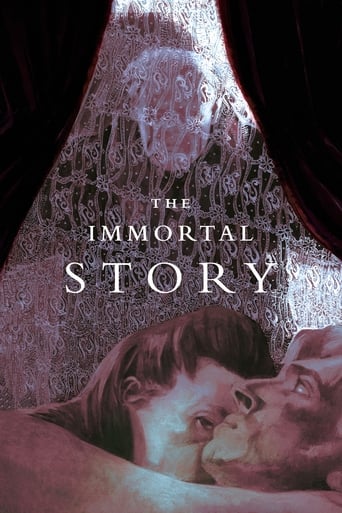Martin Bradley
Certainly not the late masterpiece some people have claimed it to be but Orson Welles' "The Immortal Story" is still extraordinary in ways so many films aren't. It clocks in at under an hour so it really is the perfect miniature. It is a film about the art of story-telling with only four main speaking parts. Welles could just as easily have done this on the radio and yet visually this is extremely beautiful, (it was his first film in colour), and still typically 'Wellesian'.He adapted it from a novel by Isak Dinesen and he, himself, plays the role of the old merchant in the 'story' of the old merchant who hires a young sailor to sleep with his young wife, (Jeanne Moreau is the woman hired by the merchant to play the wife in the story). The sailor is played by the English actor Norman Eshley and he's painfully wooden but he doesn't upset the flow of the piece; in fact, his banal, robotic diction actually fits it. No masterpiece then, but this short piece, which almost feels thrown together, stands head and shoulders over the best work of many lesser directors.
emwolf
Welles continues to amaze me. I've made an effort to track down some of his less available movies, such as F For Fake, and this one. This is closer in style to the Magnificent Ambersons than anything else I've seen. Welles seems to have a love for the people of this world he creates and frames them in vibrant colors with golden lighting. The pace, unlike the majority of his works, is slow and deliberate without the trademarked quick editing. The story, too, is not rushed and the ironic twists are revealed with a sense of sadness, no one's "comeuppance" seemed justified but rather a tragic outcome of each character's personal flaws. I really recommend this for fans of the master. I think many will find this odd and I imagine that many younger viewers (the ones who find black & white dull or Hitchcock overrated) will find this unwatchable.
Hollywoodshack
Welles' film is a great comment on greed and the love of riches, and how futile it is when you can't take it with you after life ends. Wealthy Mr. Clay demands his assistant make the story he heard on ships from sailors come true. He pays the daughter (Jean Moreau) of a business partner he ruined and a poor young sailer (Norman Eishley) to sleep together one night so Clay can be the godfather of the child they conceive since Clay couldn't father children with his own wife. There is an ironic surprise for this plan when it completes, Welles using a brilliant color scheme and expert camera angles through every shot and scene. Clay's character is especially good with Welles filling the stuffy, wicked sturdiness of his portrayal almost like greed and evil personified.
Neil Doyle
Having said that, it's strictly an art piece about a bankrupt merchant (ORSON WELLES) who for some unknown reason wants to turn a myth into reality by hiring two people to play out the theme of a story the townspeople have turned into a myth.The setting is Macao, China and the slow moving tale is narrated by Welles as Mr. Clay, a bitter old man with a faithful servant/assistant. Welles, by this time in his career, had deteriorated physically to the point where some of his dialog is hard to understand since he barely moves his mouth when he speaks.He pays his assistant to locate a woman and a sailor who can reenact the tale inside his own palatial house. JEANNE MOREAU is the young woman who agrees to play her part in "the comedy" after being assured that she will be paid handsomely for her contribution to making the old man's story come to life. Moreau talks and talks to the assistant about her background in this very literary tale where there is so little movement to propel the story forward.Mr. Clay himself chooses the sailor, a tattered looking blond whom he invites to his home with the promise of five guineas. And he talks and talks and talks. "It's hard on you being so old and dry," the sailor tells Welles. And indeed, Welles, as Mr. Clay, does look old and dry beyond his seventy years. But Mr. Clay is intent on making a tale that has been invented really happen.Handsomely photographed in subdued color, it's a very enigmatic tale that really doesn't make much sense when it's all over. Chalk it up to another pretentious bore from Welles, who based his screenplay on a novel by Isak Dinesen (author of "Out of Africa").Summing up: A misfire and enigma that Welles originally planned as part of an anthology of stories.

